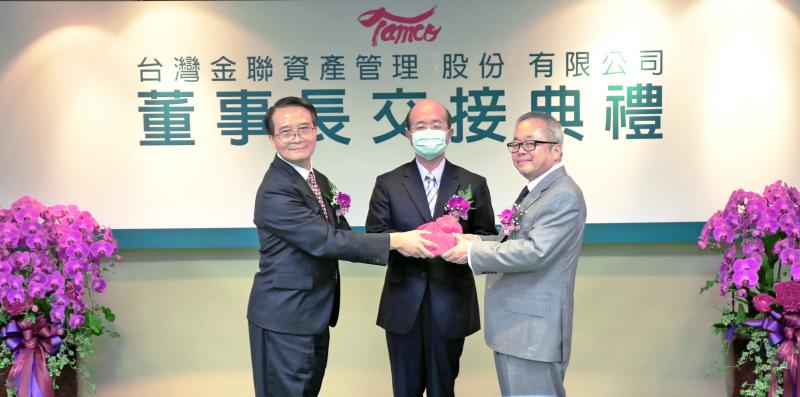The board of state-run Taiwan Asset Management Corp (TAMC, 台灣金聯) yesterday approved the appointment of former vice premier Shih Jun-ji (施俊吉) as its chairman, a position that has been vacant for 18 months.
Shih said that he would give reasons for his latest change of position after he puts TAMC on the right track.
The company’s helm has been vacant since former minister of labor Lin Mei-chu (林美珠) resigned in December 2018.

Photo courtesy of Taiwan Asset Management Corp
Lin quit one day after she was sworn in, bowing to criticism about favoritism from opposition parties.
Lin is a cousin of President Tsai Ing-wen (蔡英文).
Shih, 65, was tapped by the Executive Yuan to head the company, of which the government controls a stake of more than 80 percent.
TAMC, the nation’s largest bad-loan operator, has been expanding into property management and real-estate construction as the nation’s pool of bad loans diminishes.
Shih expressed gratitude to TAMC president Kuo Wen-jin (郭文進), who had to double as acting chairman in the interim.
Shih, who holds a doctorate in economics, has served as chairman of the Taiwan Stock Exchange and a minister without portfolio, as well as a member of the Financial Supervisory Commission and the Fair Trade Commission.
“The local bourse rallied to more than 10,000 points under my stewardship, lending support to my credentials, Shih said, asking colleagues to wait and see his achievements.

South Korea’s equity benchmark yesterday crossed a new milestone just a month after surpassing the once-unthinkable 5,000 mark as surging global memory demand powers the country’s biggest chipmakers. The KOSPI advanced as much as 2.6 percent to a record 6,123, with Samsung Electronics Co and SK Hynix Inc each gaining more than 2 percent. With the benchmark now up 45 percent this year, South Korea’s stock market capitalization has also moved past France’s, following last month’s overtaking of Germany’s. Long overlooked by foreign funds, despite being undervalued, South Korean stocks have now emerged as clear winners in the global market. The so-called “artificial intelligence

Chinese artificial intelligence (AI) start-up DeepSeek’s (深度求索) latest AI model, set to be released as soon as next week, was trained on Nvidia Corp’s most advanced AI chip, the Blackwell, a senior official of US President Donald Trump’s administration said on Monday, in what could represent a violation of US export controls. The US believes DeepSeek will remove the technical indicators that might reveal its use of American AI chips, the official said, adding that the Blackwells are likely clustered at its data center in Inner Mongolia, an autonomous region of China. The person declined to say how the US government received

‘SEISMIC SHIFT’: The researcher forecast there would be about 1.1 billion mobile shipments this year, down from 1.26 billion the prior year and erasing years of gains The global smartphone market is expected to contract 12.9 percent this year due to the unprecedented memorychip shortage, marking “a crisis like no other,” researcher International Data Corp (IDC) said. The new forecast, a dramatic revision down from earlier estimates, gives the latest accounting of the ongoing memory crunch that is affecting every corner of the electronics industry. The demand for advanced memory to power artificial intelligence (AI) tasks has drained global supply until well into next year and jeopardizes the business model of many smartphone makers. IDC forecast about 1.1 billion mobile shipments this year, down from 1.26 billion the prior

FORTUNES REVERSED: The new 15 percent levies left countries with a 10 percent tariff worse off and stripped away the advantage of those with a 15 percent rate In a swift reversal of fortunes, countries that had been hardest hit by US President Donald Trump’s tariffs have emerged as the biggest winners from the US Supreme Court’s decision to strike down his emergency levies. China, India and Brazil are among those now seeing lower tariff rates for shipments to the US after the court ruled Trump’s use of the International Emergency Economic Powers Act to impose duties was illegal. While Trump subsequently announced plans for a 15 percent global rate, Bloomberg Economics said that would mean an average effective tariff rate of about 12 percent — the lowest since